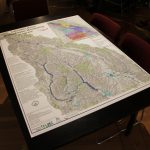What a Decade of Water Action means for Living Lakes Canada
 By Living Lakes Canada Stewardship Coordinator Raegan Mallinson
By Living Lakes Canada Stewardship Coordinator Raegan Mallinson
In 2016, the United Nations and World Bank Group convened a High Level Panel on Water (HLPW) to provide leadership in tackling one of the world’s most pressing challenges – an approaching global water crisis.
In advance of World Water Day 2018 on March, the United Nations and HLPW launched the Water Action Decade 2018–2028, calling for a fundamental shift in global water management.
The UN Decade of Water Action has 3 main Foundations for Action:
- UNDERSTAND WATER… Commit to making evidence-based decisions about water, and cooperate to strengthen water data, such as through the HLPW World Water Data Initiative.
- VALUE WATER… Use the HLPW Principles on Valuing Water to sustainably, efficiently, and inclusively allocate and manage water resources and deliver and price water services accordingly
- MANAGE WATER… Implement integrated approaches to water management at local, national, and transboundary levels, strengthen water governance, and ensure gender equality and social inclusion.
Why does this matter? 40% of the world’s people are affected by water scarcity.
What does this mean for Canada? Canada is home to 20 per cent of the world’s freshwater supply.
What does this mean for Living Lakes Canada? Living Lakes Canada engages people across the country to build a water stewardship and conservation ethic through hands-on water monitoring training and watershed health education, and by involving communities, academics, industry, governments and First Nations in building climate resiliency within our communities through linking applied science for water and land-use management and decision-making.
Our projects and activities contribute to the conservation of Canada’s water through increased knowledge, awareness, engagement and actions to protect Canadian watersheds.
Taking responsibility for the watersheds on which we depend will be essential for implementing the UN Decade for Water Action. Through education and training in water monitoring protocols, communities across Canada will better understand the state of their watersheds, potential threats such as pollution and destruction, and be able to collaborate, share ideas for the conservation and remediation of their watersheds, and raise the importance of the water dialogue to the level of urgency it now requires now.
With 40% of the world’s people affected by water scarcity and with Canada being home to 20% of the world’s freshwater supply, we are faced with an important task in water management and conservation as our models are being recognized around the world.
Water Canada spoke to Sulton Rahimzoda, First Deputy Minister of Energy and Water Resources of the Republic of Tajikistan about the Decade:
“We need as many countries as possible to join efforts and advance the water agenda at all levels. Canada is definitely a leader on water resources. The International Joint Commission on shared waters with the United States is one of the first and finest examples of water cooperation, inspiring many countries around the world. The joint management of transboundary waters, such as in the Colombia Basin is a model for many basins.”
Why Canada Should Engage in the New Water Decade: Republic of Tajikistan
Also in advance of World Water Day 2018, the HLPW issued a report summarizing its findings and recommendations.
Making Every Drop Count: An Agenda for Water Action (https://sustainabledevelopment.un.org/content/documents/17825HLPW_Outcome.pdf) outlines 3 Calls to Action:
- TURN OFF denial of global water crisis, turn off waste and pollution, and destruction of watersheds, turn off of fetching water and turn to a path of education
- TURN ON solutions, ideas, innovations, investments in infrastructure, sanitation, ecosystem management and resilience; political will of how we understand, value and manage water
- TURN UP the urgency and volume on water dialogue; intensity to keep water promises; the heat on those who misuse water; the funding and the value we place on water
UN High Level Panel on water asks that people:
- Value water
- Take action quickly, decisively and collectively
- Address our global water crisis
- Meet our goals
See below for the High Level Panel on Water Video, Water’s Promise: Making Every Drop Count:
See below for Water Canada’s article United Nations Calls for Fundamental Shift in Global Water Management:
United Nations Calls for Fundamental Shift in Global Water Management
(Excerpt) The panel’s report sets out a three-pillared agenda to define essential activities to meet SDGs, and goal 6 in particular:
- Foundations for action. This includes understanding water from an evidence-based decision framework, support by sound data; valuing water with a mind to sustainability, efficiency, and inclusivity to manage and deliver water resources appropriately; and managing water equitably and inclusively at all levels of governance.
- An integrated agenda. This includes universal access to water and sanitation; resilient societies and economies to reduce disaster risk; increased water infrastructure investment; nurturing environmental water by preventing pollution and degradation; and developing sustainable cities.
- Catalyzing change, building partnerships, and international cooperation. This includes promoting innovation; strengthening partnerships; and increasing global water cooperation.





